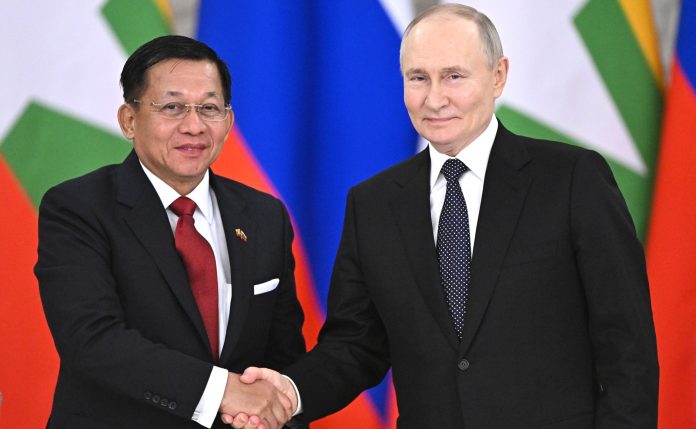Guest contributor
Antonio Graceffo
As relations between Russia and Myanmar strengthen, there is growing concern that an end to the war in Ukraine could allow Russia to shift more of its focus, energy, and resources toward its investments in Myanmar while increasing military aid to the junta.
Earlier this month, Russian President Vladimir Putin hosted Myanmar’s junta leader Min Aung Hlaing, at the Kremlin, underscoring Moscow’s deepening ties with Naypyidaw despite Western sanctions on both nations.
This was Min Aung Hlaing’s fourth visit to Russia since the 2021 coup but the first official invitation from Putin. Their talks, attended by Russian Foreign Minister Sergei Lavrov, Russian Defence Minister Sergei Shoigu, and other top officials, focused on expanding cooperation in trade, defense, energy, and infrastructure.
Russia views Myanmar as a key strategic partner in countering Western influence in Southeast Asia. The country offers Russia access to rare earth minerals, energy resources, and a potential naval foothold in the Indian Ocean.
Trade between the two nations grew by 40 percent in 2024, with discussions also covering expanded economic collaboration, including Russian investment in Myanmar’s Dawei Special Economic Zone—a long-delayed project aimed at becoming a major industrial and transport hub on the Andaman Sea.
Moscow agreed to allow Myanmar to open consulates in St. Petersburg and Novosibirsk while also expanding nuclear energy cooperation. The two nations signed an intergovernmental agreement for a 110 MW small modular reactor (SMR) project, with the potential to expand to 330 MW.
The deal was signed by Rosatom Director General Alexei Likhachev and Myanmar’s Science and Technology Minister Myo Thein Kyaw. Rosatom, Russia’s state-owned nuclear energy company, reports directly to Vladimir Putin.
Beyond its civilian energy role, it is deeply involved in Russia’s nuclear weapons complex, uranium enrichment, and military research. As a major exporter of nuclear technology, Rosatom serves as a key instrument of Moscow’s geopolitical strategy, using energy agreements to expand Russian influence.
Myanmar’s junta, struggling against armed pro-democracy groups that control much of the country, is seeking increased military aid from Russia, particularly drone technology.
Russia is already Myanmar’s largest arms supplier, providing fighter jets, attack helicopters, air defense systems, and armored vehicles. Since the 2021 coup, Moscow has sold Su-30 fighter jets, Mi-35 attack helicopters, Pantsir-S1 air defense systems, and Orlan-10 drones to Naypyidaw, while also blocking U.N. Security Council resolutions against it.
A U.N. report reveals that Myanmar’s junta has imported at least $1 billion USD in weapons since the coup, with $406 million USD coming from Russia.
U.N. Special Rapporteur on human rights in Myanmar Tom Andrews identified 254 suppliers involved in these transfers. The junta has used these weapons, including Russian-supplied Yak-130 aircraft and Mi-35 helicopters, in airstrikes and ground attacks that have killed thousands, including children, and destroyed villages, schools, churches, hospitals, and IDP camps.
According to the U.N. Children’s Fund (UNICEF), 650 children have been killed or injured in 2024 alone.
With Myanmar preparing for 2025 elections—widely seen as a move to entrench Min Aung Hlaing’s junta—Russia’s support remains critical as it, along with China, continues to bolster military rule. Despite Western sanctions, arms shipments persist through front companies and weak enforcement.
Meanwhile, recent developments in Europe suggest negotiations between Kyiv and Moscow may soon take place, as U.S. President Donald Trump threatens to withhold military aid to Ukraine.
While an immediate resolution is unlikely, the conflict appears to be shifting toward eventual de-escalation. An end to hostilities would be welcome globally but could have serious implications for Myanmar.
A post-war Russia would regain military, economic, and diplomatic resources, allowing Moscow to deepen its involvement in Myanmar. Already Myanmar’s largest arms supplier, Russia has provided fighter jets, attack helicopters, and air defense systems, but the Ukraine war has limited its exports as weapons factories prioritize battlefield replenishment.
With fewer military obligations, Russia could accelerate arms shipments, send more advisors, trainers, and private military contractors (PMCs), and invest heavily in Myanmar’s energy, infrastructure, and resource sectors.
Freed from the financial burden of war, Moscow could also expand defense cooperation in Southeast Asia, using Myanmar as a strategic foothold to counter U.S. and Western influence in the region.
China has already signed an MOU with the junta to establish a security company in Myanmar, while recent changes to Myanmar’s laws now allow private security firms to carry firearms.
This opens the door for Chinese or Russian paramilitary forces—in partnership with the junta—to operate under the guise of private security, similar to Russia’s Wagner Group interventions abroad.
If Russia redirects military, financial, and diplomatic resources to Myanmar after the Ukraine war, it could strengthen the junta’s war effort, intensify the fighting, and complicate regional security dynamics. This would counter Western and regional efforts to contain the crisis while further entrenching Russian and Chinese influence in Myanmar.
Antonio Graceffo, PhD, holds advanced degrees in economics and national security. A graduate of American Military University, he has spent more than 20 years in Asia, contributing to think tanks and international media.
DVB publishes a diversity of opinions that does not reflect DVB editorial policy. We’d like to hear what you think about this or any of our stories: [email protected]



